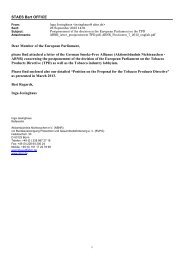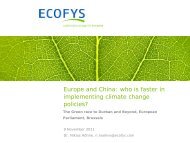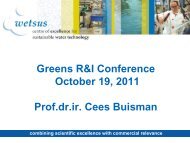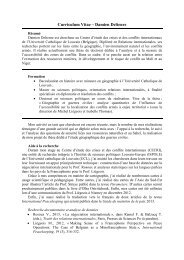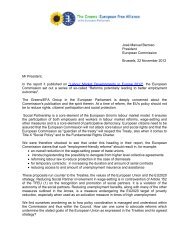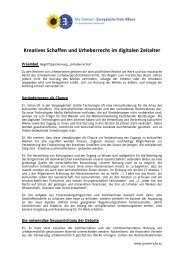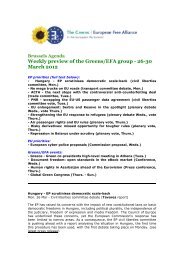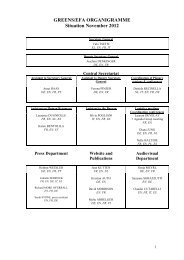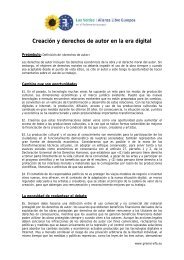Agro-Biotechnology: - The Greens | European Free Alliance
Agro-Biotechnology: - The Greens | European Free Alliance
Agro-Biotechnology: - The Greens | European Free Alliance
Create successful ePaper yourself
Turn your PDF publications into a flip-book with our unique Google optimized e-Paper software.
Need for regulation| Cloned farm animals - a ‚killing application‘? | 35<br />
in Denmark:<br />
“Another type of concern is animal integrity. This was raised in connection<br />
with the Danish legislation on farm animal cloning. Integrity can be defined in<br />
a number of ways, but here it implies that more is at stake than animal welfare:<br />
that is, integrity demands that we ask whether animal cloning technology<br />
conflicts with what is considered permissible human utilisation of animals,<br />
regardless of reduced welfare or not.”<br />
Basic ethical concerns directed at animal welfare and animal integrity as well<br />
as socio-economic impacts must not be ignored when decisions about the regulation<br />
of SCNT are made. Compared to issues regarding food safety these issues<br />
might be harder to assess, but nevertheless they are accepted as being relevant<br />
under legislation within the EU. Ignoring widespread concerns and consumer<br />
rejection can put the legitimacy of the EU into question.<br />
A poll by Eurobarometer published in October 2008 36 showed that 58 percent<br />
of the <strong>European</strong> citizens thought that cloning for food production could never<br />
be justified. A big majority of 83 percent said that special labelling should be<br />
required if food products from the offspring of cloned animals became available<br />
in the shops. 63 percent stated that it was unlikely that they would buy meat<br />
or milk from cloned animals, even if a trusted source stated that such products<br />
were safe to eat. Similarly, in the US, 77 percent of the American consumers<br />
are “not comfortable” with eating cloned animal products, and 81 percent of the<br />
American consumers believe that cloned foods should be labelled 37 .<br />
Consumers might be turned into some kind of 'end of pipe hostage'. <strong>The</strong>y are<br />
already trapped in the usage of genetically engineered plants. <strong>The</strong>re is a high<br />
risk that in the case of cloned farm animals the food market simply dispose<br />
products from extreme industrial agricultural production without respecting<br />
the wishes of a broad majority of consumers who reject those kinds of products.<br />
If the EU decides not to have a general ban on the cloning of animals for food<br />
production, at least a high degree of transparency and traceability should be<br />
put into place in order to enable sufficient choice at the level of farm and food<br />
production as well as within the food market. <strong>The</strong>se mechanisms might generate<br />
high costs and confine the economic advantages to small niche market in<br />
animal production.<br />
36 http://europa.eu/rapid/pressReleasesAction.do?reference=IP/08/1478&format=HTML&aged=0&lan<br />
guage=EN<br />
37 US Food Marketing Institute, May 2008<br />
http://www.fmi.org/news_releases/index.cfm?fuseaction=mediatext&id=935



